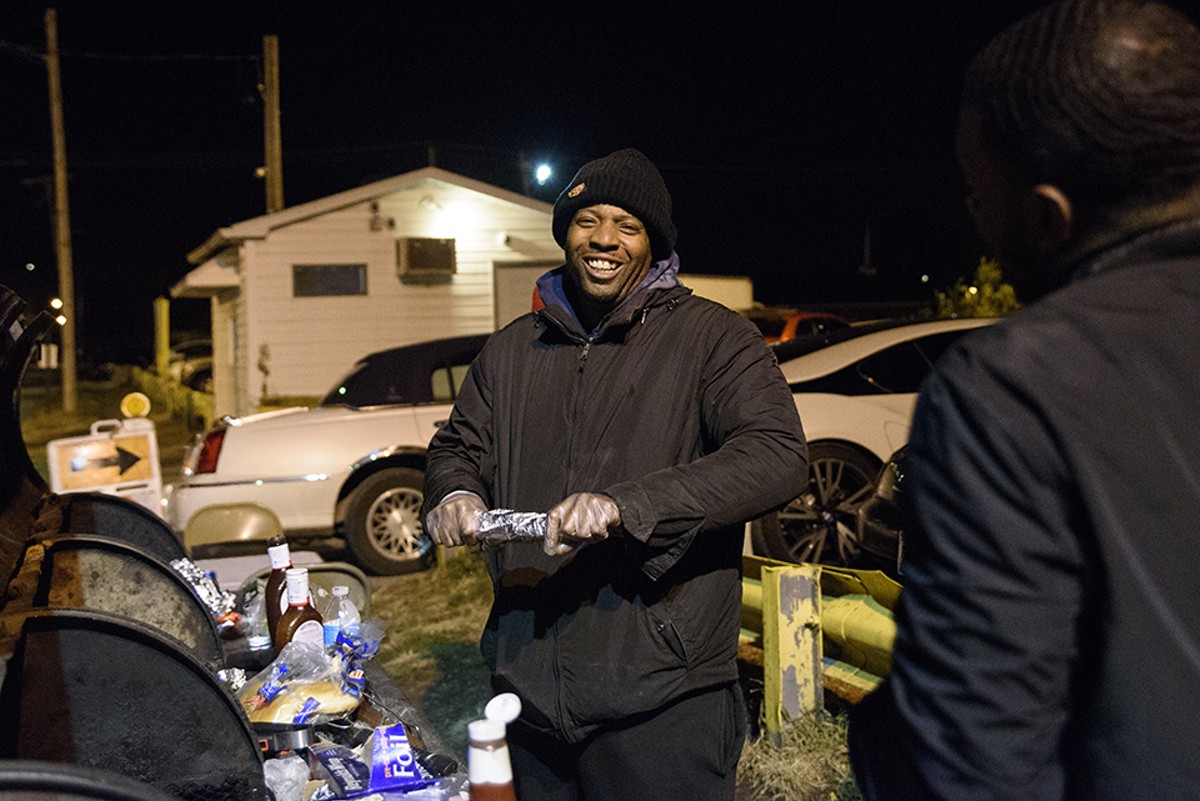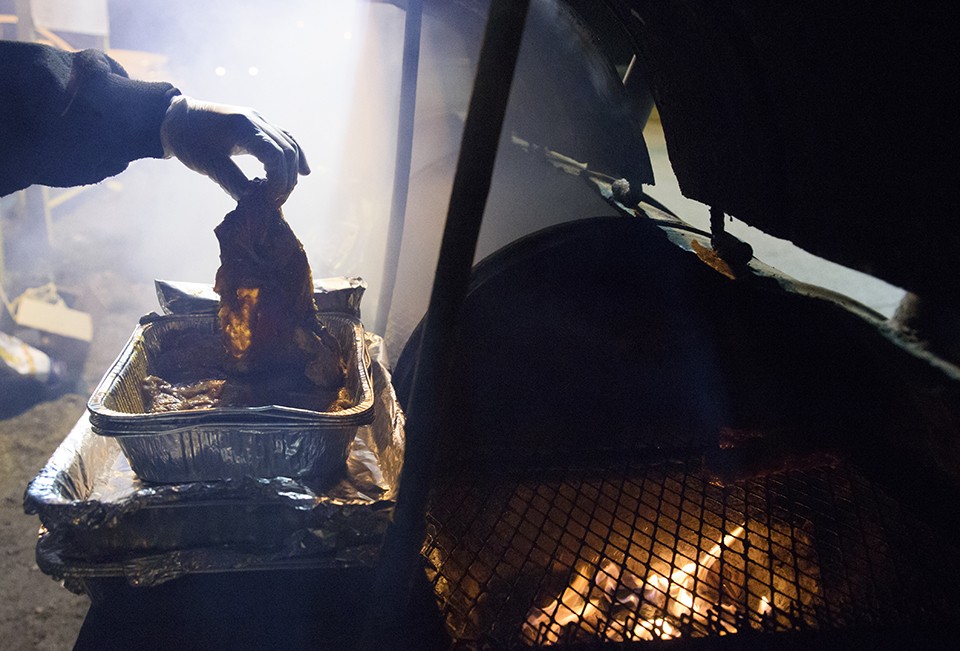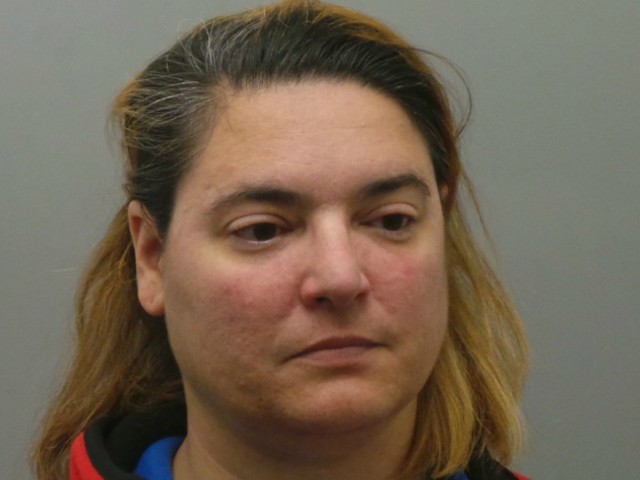Inside the Pink Slip, the night has crested by 5:20 a.m.; that much you can tell right away. Or, at least, right after you're actually, really, truly inside. First comes a cover charge, waived for a reporter by a sharp-looking security chief with a bowler, shined shoes and walking stick. There's a pass through a full-sized metal detector, then a quick, personal pat-down for good measure. A quick Google search shows the reason for this caution, with newspapers reporting occasional gunfights taking place outside and, more rarely, inside. It's not a regular thing, but it happens, and if you believe the Evening Whirl, Brooklyn seems like the best place in St. Louis to catch lead in the buttocks.
In theory, there's a party happening here, even deep into the 5 o'clock hour. The music's loud, but the dancers have abandoned the multiple stages criss-crossing the room. Those left are hanging out with the few remaining customers, most of whom are either making a play for continued fun off premises or are tucked away in the club's nooks and crannies.
A dancer approaches, realizes that her pitch for a personal dance isn't going anywhere; no money means no conversation which means nothing personal. Nearby, a gent's stock-still in a chair; he's upright, but sleeping, despite the rumble of bass everywhere. The bathroom attendant is still on duty, dispensing mints and toiletries for an expected $1 tip.
It's an odd scene with no dancers on stage, despite the club boasting between two and three dozen performers on weekend nights. It's maybe the thing that catches your eye the most, save the adult cinema playing on the overhead TV monitors. In some respects, it's all strangely unerotic by this hour.
Partying in Brooklyn is a hobby with a history.
tweet this
But the dancers aren't necessarily the show, at least not totally. With the city of East St. Louis' downtown nightlife, legendary for just shy of forever, slowly dwindling over the past decade, after-hours drinkers from St. Clair County use the Pink Slip and Bottoms Up as an after-hours club, the $10 cover accepted as the simple cost of partying here. And partying in Brooklyn is a hobby with history.
In 2004, a writer named Scott Eden wrote a lengthy piece about the four communities in southwestern Illinois offering adult entertainment: Sauget, Washington Park, Centreville and Brooklyn. That the piece, "Fantasies Made Fresh," ran in a Montreal-based lit magazine named Maisoneauve is odd enough. Written by a non-local, it's also a sprawling bit of Hunter Thompson-style travel/economics journalism, sprinkled with major doses of local color. And while some of the facts have changed since 2004, the piece's general dissection of the Brooklyn club scene remains spot-on.
At one point, Eden writes of the East Side's specific appeal: "For years, since at least Prohibition, the east side has been the site of a roisterous nightlife. Brooklyn, always the focus of the action, was once known as 'Little Las Vegas.' Gambling and whoredom, in that order, were then the chief attractions. Only in the late nineteen-seventies did striptease, a natural new input, gain a foothold. Connoisseurs of the region's more recent entertainments say that the Illinois strip-club scene reached its raucous, lurid apex in the late nineteen-eighties, before riverboat gambling siphoned off the clientele. Nonetheless, a level of permissiveness endures, and it can only be ascribed to the status the clubs enjoy within the municipal hegemony."
But the idea of "heading to the East Side" has gone through many societal shifts, and "hall pass" and "boy's night out" mentalities aren't as accepted today as in the past. In a time of fallen-and-falling media/political icons, in an age of a deep questioning over gender roles and behaviors, the idea of a binge at strip clubs seems dated — something belonging in the deep past of, say, 2014.
And the bookstores, selling way more VHS tapes than books back in the day, were supplanted over the decades by on-demand adult programming (the lone shop that remains in Brooklyn is the exception proving the rule). It doesn't help that, thanks to the pervasive surveillance of cameras and cellphones, even the private, back rooms of Brooklyn now have an uncertain claim to anonymity.
The Rust Belt economy surely factors into Brooklyn's general vitality, too. An example is Fantasyland. Dead for more than a decade, its weather-beaten sign still hangs along Route 3, while the building itself is long since imploded, a giant dust pile in the nightlife zone's center, mature weed trees springing out of the combo-club/theater's rubble. Metaphor is where you look for it.
Outside a light rain has just begun again, more of a mist, really; even ten minutes inside the club is enough time that you feel you're re-entering the real world with a single step onto the sidewalk.
By this hour, there is less than a half-hour of commerce left, and more people are departing than arriving in Brooklyn, cars slowly (and quickly) leaving the lots. For most intents and purposes, it's the end of what's known as Friday night in Brooklyn, and what's looking a whole lot like Saturday morning for the rest of the world.
At 5:30 a.m., everything feels a little heavy and exhausting. But damn, if Nell ain't still out there hawking those Polish to many a Cuzzo.
It wasn't really a good night in Brooklyn, though Johnson, "the Parking King," announces that he did OK. You "can never put down a night that helps pay the bills," he says.
Mind you, he says this from the back seat of his golf cart, which is customized with wind sheets and the classic vanity plate "WEEKENZ"; from this ride, he oversees a small force of lot attendants.
At one point, relatively early in the evening, one of them engages in a strange, mostly wrestling altercation with a muscle-shirted patron about 200 feet from the grill. Whatever this dust-up is, whatever it's about, goes right past Nell. He's seen a few of these moments. He knows better than to get excited. "It is what it is. Things can happen out here. We're all trying to keep the same approach. We all wanna go home safe. All of us."
"We all wanna go home safe. All of us."
tweet this
When Nell does finally go home, it's a bit after six, the rain finally falling steadily. So the next night gets a bit later start; he doesn't fire up the coals until closer to 1:30 a.m. or so. Hey, it's still early in the rush, and at some point, a man has to nap.
Nell is somehow able to juggle it: working a day job, working an overnight job, living a life outside of this immediate block. It doesn't seem like a recipe for a long-term lifestyle. But Nell's good with it, with all of it. The cooking, the feeding, the employing, the industry: "For real, if you gotta work, you gotta work."
And when Nell's not cooking, he's talking, he's directing traffic, he's pointing out the oddities of the place with hints of humor. He indicates a building just a few dozen feet away, a shabby, white-framed building with a broken window that, of all things, is the Brooklyn Police substation. You can stand there all damned night and not realize that this is the building's purpose, but, suddenly, when you realize that purpose, you see the dozen cameras. "Those are how they solve the crimes that do get committed," he says.
It's a detail that's right out there in the open, but hidden to an outsider's eyes — a reminder that there are pockets of a life all around us that we simply don't see, hear or experience. Like, there's probably a corner of your brain that realizes a stripper is getting a ride home from her cousin at 5:45 a.m., handed a free turkey leg by a construction worker who happens to specialize in overnight grill mastery, but you usually don't pay much attention to that corner of your brain.
Every night, Nell oversees this scene, barking "we got the fresh hot baah-are-be-cuuue" on his battery-powered microphone. He's out here feeding people, his simple sandwiches the chaser for nights filled with liquor and libido. He's the philosopher, decked out in a plaster-spackled jumpsuit. He's the guy who proves that we're all unique, some more unique than others, and some cut from a thicker, tougher cloth.
"It's not the life for everybody," he says.
Not for the first time this evening, he's right.








